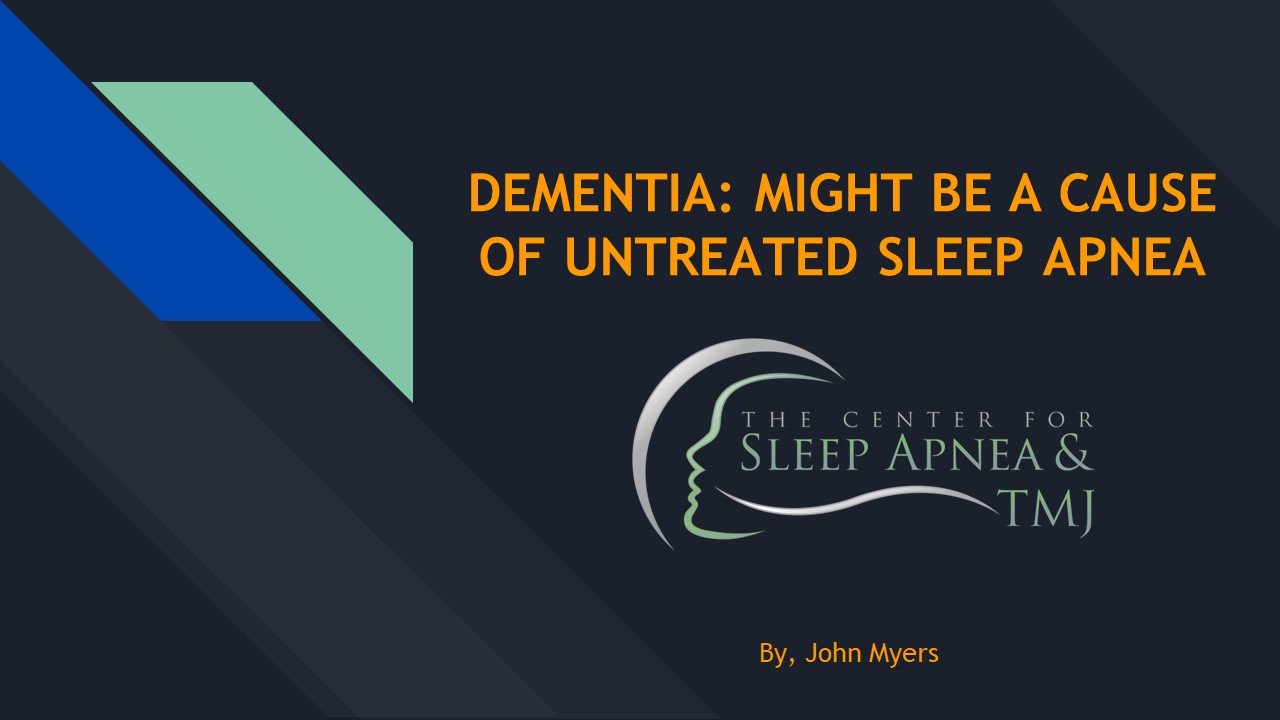DEMENTIA: MIGHT BE A CAUSE OF UNTREATED SLEEP APNEA - PowerPoint PPT Presentation
Title:
DEMENTIA: MIGHT BE A CAUSE OF UNTREATED SLEEP APNEA
Description:
The most important lesson from this new study is to make sure those who have sleep apnea are recognised and offered treatment options. Otherwise, these individuals would continue to experience problems including dementia, memory loss, depression, diabetes, and elevated risks of heart attack or stroke. – PowerPoint PPT presentation
Number of Views:10
Title: DEMENTIA: MIGHT BE A CAUSE OF UNTREATED SLEEP APNEA
1
DEMENTIA MIGHT BE A CAUSE OF UNTREATED SLEEP
APNEA
- By, John Myers
2
Do Dementia Patients Have Trouble Sleeping?
- Untreated obstructive sleep apnea (OSA) patients
may face a variety of symptoms, from extreme
daytime exhaustion to cognitive decline.
Researchers set out to find out if there was a
connection between sleep apnea and the beginning
of dementia and Alzheimer's Disease because OSA
is common in older people. - Patients with dementia are affected by sleep
disturbances such insomnia and obstructive sleep
apnea. Both conditions impair restful sleep,
which affects the health of the brain. - Patients with dementia frequently experience
sleep loss due to reduced intervals of sound
rest. Reduced sleep can lead to an increase in
proteins associated with Alzheimer's disease
development. - Patients who suffer from OSA on a daily basis may
also be losing sleep, harming their brains
irreparably, and exacerbating dementia symptoms.
Making judgments and attention are tough when OSA
patterns are persistent. The effects of dementia
are impacted by each of these symptoms. - According to the study, those who regularly
reported sleeping six hours or less had a 30
higher chance of developing dementia. Undiagnosed
and/or Untreated Sleep Apnea is one of the main
causes of insufficient sleep in humans.
3
Can Poor Sleep Lead To Dementia?
- Poor sleep habits may not only contribute to
dementia but may also be the cause of it in some
cases. Chronic sleep deprivation brought on by
insomnia has been linked to early onset dementia.
- Even healthy brains are affected by sleep loss,
which can start deteriorating brain function long
before dementia is identified. - Chemicals in the brain are released as the brain
tries to adjust to irregular or constrained sleep
patterns. The brain is significantly altered by
these substances throughout time. - Numerous sleep-related problems, such as
difficulty concentrating and remembering things,
are also early warning indications of dementia.
- Patients with obstructive sleep apnea frequently
experience restricted airflow or brief stops in
breathing throughout the course of each night.
4
How Does Sleep Apnea Contribute to Dementia?
- When the airway completely or partially closes
while you sleep, you get sleep apnea. Because of
this obstruction, oxygen cannot enter the body or
reach the brain. In extreme circumstances, these
occurrences can occur up to 30 times or more
every hour. - Cognitive impairment is one of the sleep apnea
symptoms that is most frequently seen (i.e.
forgetfulness, lack of concentration, etc). The
clinical beginning of dementia and Alzheimer's
Disease in elderly persons is frequently
associated with the same symptoms. - OSA and cognitive impairment, such as
Alzheimer's, were investigated in a review
article that was published in the Journal of
Alzheimer's Disease. - When sleep disordered breathing (SDB) was studied
in older women, it was discovered that 44.8 of
the subjects went on to develop dementia or
cognitive impairment. Dementia only occurred in
31.1 of females without SDB. - There are around 20 million adults in the US who
have OSA, or one in every fifteen of them. In
addition, it's thought that 80 of individuals
affected don't have an OSA diagnosis, therefore
they cannot be treated. Not only is their amount
of sleep insufficient, but also the type of sleep
required to preserve brain function.
5
Will Treating Sleep Apnea Prevent Dementia?
- There isn't much research on using obstructive
sleep apnea therapy to treat dementia or
Alzheimer's. - According to a research in Neurology, people with
untreated sleep apnea began developing dementia
about 10 years earlier than people without SDB. - The most popular form of treatment for those with
sleep apnea is continuous positive airway
pressure (CPAP) equipment. - The gadget can save a patient's life while also
vastly enhancing their quality of life because it
keeps the airway open while they sleep. - More immediately, it can be exceedingly harmful
for OSA patients (diagnosed and undiagnosed),
even for just one night, to stop utilising CPAP
therapy.
- Medicare and medical insurance frequently cover
oral appliance therapy. The Center for Sleep
Apnea and TMJ of Utah still provides free
telemedicine evaluations for those who want a
CPAP Backup or who regrettably have not been able
to tolerate CPAP use in the past.
6
THANK YOU!
- Address -
- 6287 S Redwood Rd 101,
- Taylorsville, UT
- 84123
- United States
- Visit us -
- https//www.sleepandtmjutah.com/































